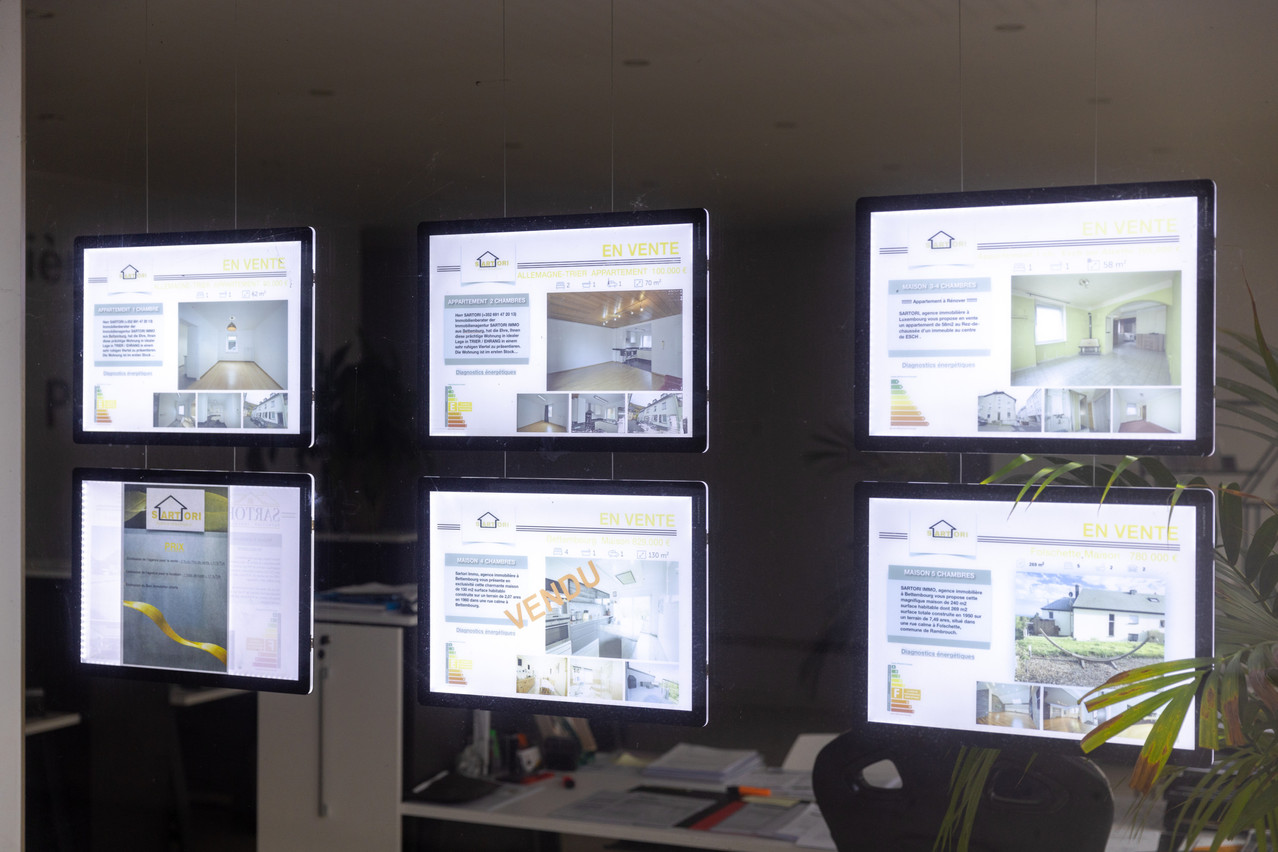, president of the Chambre immobilière du Grand-Duché (Real Estate Chamber of Luxembourg), an organisation that represents the professions of estate agent, property manager and promoter, has made a serious observation. According to him, 1,000 fewer dwellings were built in 2022 and 1,500 more will be lacking in 2023, compared to the previous annual average of 4,000 or so. As a result, he says, real estate agencies have between 40% and 50% less turnover. He is therefore calling for a job retention plan for these agencies.
On Wednesday 18 January, the Real Estate Chamber met with the economy ministry on this subject. “We explained our request to them: a plan that concerns employees in the commercial intermediation professions. It must now go to the conjuncture committee,” says Scheuren. Several solutions are envisaged to keep them busy during slack periods, such as training sessions.
Why only include employees? “There is no legal framework for short-time working for the self-employed. During Covid, they benefited from exceptional measures. But we are keeping an eye on the situation.”
A plan reserved for salaried estate agents
The plan aims to “get [us] through this difficult time without people being made redundant,” explains Scheuren. The number of people affected varies according to the agency. “It depends on how their business has fallen. Some maintain their business through renting, others do not. We want to start the process so that we are ready when they need it.” In 40 years, he has no memories of such a plan being put in place in the sector, known for its competitiveness.
Despite record sales, “the reserves have already been reached” in the agencies, which take around 3% in fees per transaction, according to several professionals interviewed.
As in all sectors, the situation is due to inflation. “The rise in interest rates in a short period of time has reduced the number of loans” and therefore demand. This is reflected in property prices which, although still rising, have been doing so less rapidly since the end of last year. AtHome calculated a growth of 2.4% in the third quarter of 2022 compared to 2021, whereas the market was up by 8% in the second and 10.5% in the first.
What about developers? They have the capacity to “resist longer”, says Scheuren, thanks for example to the monitoring of building sites. He adds, however: “We are already seeing reduced activity. We will see in the coming months if there is a need [for developers too]” for a job retention plan.
Mapping the sector
According to the latest figures from Statec, which were included in a parliamentary response, there were 1,221 agencies in Luxembourg in 2019, totalling 1,750 employees. The breakdown between independents and large groups is not known. Unsurprisingly, 31.71% are located in the canton of Luxembourg and 25.54% in Esch. They carry out around 7,800 transactions per year, says Scheuren.
More precisely, 6,837 existing flats or flats under construction and 3,547 houses were sold in 2021 in Luxembourg, in addition to 2,395 building plots, says the Housing Observatory.
1,058 companies and 1,250 employees were specialised in property development in 2019. Their gross operating surplus (EBE, the difference between income and operating expenses) had at the time risen to €470m, compared to €123m for the agencies. Their added value (wealth generated) grew to €575m, compared to €226m in the agencies.
Construction affected
The FDA, Luxembourg’s craftspeople federation, had already sounded the alarm last November: “12,000 people arrive each year and need to be housed. With 1,500 fewer homes, there won’t be enough, and that won’t be able to be recovered in the coming years,” said , secretary general, while highlighting the difficulties encountered by construction companies. Prices have increased by 15.9% between October 2021 and 2022.
“A construction company ‘earns’ on average 2% of its gross turnover. It is therefore definitely not possible to absorb future cost increases.” This explains the reluctance of some investors.
The FDA advocates an “abolition of registration fees on the share of construction already completed” to encourage developers to continue with projects despite their fears. It also advocates that public actors should be able to take over from private investors, which would allow some of them “to be completed after the state planning stage--and the municipalities could bring forward their renovation work.”
Fewer problems with notaries
When asked about long-term solutions for the agencies, Scheuren rather hopes that “the economic situation will improve. We don’t expect the situation to continue.” Still, he imagines that the situation will persist for the next six months, for which he would like to obtain his job retention plan.
From the Chamber of Notaries of the Grand Duchy, which has seven members on its board, president explains that “unlike the restricted field of action of estate agents, that of notaries is broader. We are therefore not going to apply for short-time work. It is true that the number of deeds of sale has fallen sharply, but we are still doing them in other areas. It is true that it has dropped for certain studies that were more focused on civil matters, such as Vefa (sale in future state of completion). Sales of existing buildings are still taking place, albeit at a slower pace,” she concludes.
This story was first published in French on . It has been translated and edited for Delano.
